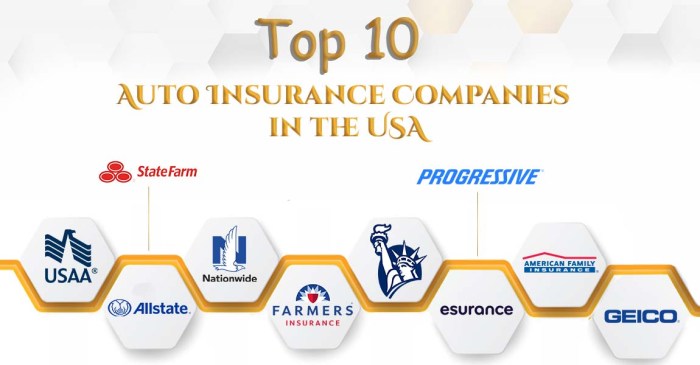
Delving into auto insurance companies, this introduction immerses readers in a unique and compelling narrative. From the history of auto insurance companies to the latest technological innovations, this guide covers all aspects of the industry in a detailed yet easy-to-understand manner.
Whether you're a seasoned policyholder or a newcomer to the world of auto insurance, this guide will provide valuable insights and information to help you navigate the complex landscape of auto insurance companies.
Overview of Auto Insurance Companies

Auto insurance companies have a long history dating back to the early 20th century when the first policies were introduced to protect drivers and their vehicles. Over the years, these companies have evolved to offer a wide range of coverage options tailored to individual needs.
Brief History of Auto Insurance Companies
Auto insurance companies started emerging in the early 1900s when cars became more common on the roads. The first auto insurance policy was issued in 1897 in the United States, and since then, the industry has grown significantly to become a crucial part of the financial sector.
Key Players in the Auto Insurance Industry
The auto insurance industry is dominated by major players such as Geico, State Farm, Progressive, Allstate, and USAA. These companies have a significant market share and offer a variety of coverage options to millions of policyholders nationwide.
Role of Auto Insurance Companies in the Market
Auto insurance companies play a vital role in providing financial protection to drivers in case of accidents, theft, or other unforeseen events. They help individuals comply with legal requirements for vehicle insurance and ensure that policyholders have peace of mind knowing they are covered in case of any mishaps on the road.
Types of Auto Insurance Offered
When it comes to auto insurance, there are several types of policies available to suit different needs and preferences. Understanding the various options can help you make an informed decision when selecting coverage for your vehicle.
Liability Insurance
Liability insurance is a basic type of coverage that helps pay for damages and injuries you cause to others in an accident. This includes property damage and medical expenses for the other party involved.
Collision Coverage
Collision coverage helps pay for damages to your own vehicle in an accident, regardless of fault. This can include repairs or replacement of your car if it is damaged in a collision with another vehicle or object.
Comprehensive Coverage
Comprehensive coverage is designed to protect your vehicle from non-collision related incidents, such as theft, vandalism, fire, or natural disasters. It provides coverage for damages not caused by a collision.
Uninsured/Underinsured Motorist Coverage
This type of coverage helps protect you if you are involved in an accident with a driver who does not have insurance or does not have enough insurance to cover your damages. It can help pay for medical expenses and vehicle repairs.
Factors Influencing Auto Insurance Rates

Auto insurance companies consider various factors when determining insurance rates for individuals. These factors can significantly impact the cost of premiums and vary from person to person.
Demographics Impact on Insurance Premiums
Demographics such as age, gender, and location play a crucial role in determining auto insurance rates. Younger drivers, especially teenagers, tend to pay higher premiums due to their lack of driving experience and higher likelihood of being involved in accidents
Gender also plays a role, with statistics showing that male drivers are more likely to be in accidents compared to female drivers. Additionally, the location where a driver lives can affect insurance rates, with urban areas generally having higher premiums compared to rural areas.
Vehicle Type and Driving Record Influence
Aside from demographics, the type of vehicle a person drives and their driving record also impact insurance rates. Expensive cars, sports cars, and vehicles with high theft rates typically have higher insurance premiums. On the other hand, drivers with a history of accidents or traffic violations are considered high-risk and will pay more for insurance coverage.
Maintaining a clean driving record can help lower insurance rates over time.
Credit Score and Rate Determination
Another factor that auto insurance companies consider when setting rates is the individual's credit score. A higher credit score is often associated with responsible financial behavior, leading to lower insurance premiums. On the contrary, individuals with poor credit may face higher rates as they are perceived to be higher risk.
It is essential for drivers to monitor their credit score and work towards improving it to potentially reduce their insurance costs.
Customer Service and Claims Process

When it comes to auto insurance companies, providing excellent customer service and a smooth claims process are crucial for policyholders. Let's delve into the customer service options offered by auto insurance companies, the typical claims process for policyholders filing a claim, and compare customer satisfaction ratings among major auto insurance companies.
Customer Service Options
- 24/7 hotline for emergencies
- Online chat support for inquiries
- Mobile app for easy access to policy information
- Dedicated customer service representatives for personalized assistance
Claims Process
- Policyholder contacts the insurance company to report the claim
- An adjuster is assigned to assess the damage and estimate the cost of repairs
- Policyholder submits any necessary documentation, such as a police report or photos of the accident
- Once the claim is approved, the policyholder receives compensation for the damages
Customer Satisfaction Ratings
- State Farm: Known for its responsive customer service and efficient claims process
- GEICO: Highly rated for its user-friendly online platform and quick claims processing
- Progressive: Offers a variety of contact options for customer service and a hassle-free claims process
- Allstate: Focuses on customer satisfaction through personal assistance and support throughout the claims process
Technologies and Innovations in Auto Insurance
Technology plays a significant role in shaping the auto insurance industry, revolutionizing the way companies interact with customers, assess risk, and process claims. Let's explore some of the key technologies and innovations that are transforming auto insurance services.
Telematics and Usage-Based Insurance
Telematics, a combination of telecommunications and informatics, is a technology that enables auto insurance companies to collect real-time data on a driver's behavior behind the wheel. This data includes information on speed, acceleration, braking patterns, and even the time of day when the vehicle is in use.
By analyzing this data, insurers can offer usage-based insurance policies that tailor premiums to individual driving habits. This personalized approach not only benefits safe drivers with lower rates but also encourages others to improve their driving behavior.
AI and Data Analytics
Artificial intelligence (AI) and data analytics are being increasingly utilized by auto insurance companies to streamline processes, enhance customer experience, and accurately assess risk. AI-powered chatbots are being used to provide instant customer support, while machine learning algorithms analyze vast amounts of data to identify patterns and predict future trends in claims management and fraud detection.
These technologies enable insurers to make data-driven decisions quickly, ultimately improving operational efficiency and reducing costs.
Emerging Trends
The auto insurance industry is witnessing the emergence of innovative trends such as blockchain technology, which enhances data security and transparency in transactions. Additionally, the rise of connected cars and IoT devices is opening up new possibilities for insurers to gather real-time information on vehicle performance and driver behavior.
As technology continues to evolve, auto insurance companies are expected to leverage these advancements to offer more personalized, efficient, and cost-effective insurance solutions to their customers.
Last Recap
In conclusion, auto insurance companies play a crucial role in safeguarding vehicles and providing financial protection to policyholders. From the various types of insurance policies to the factors influencing rates and the latest technologies shaping the industry, this guide has shed light on the key aspects of auto insurance companies.
Stay informed, stay protected, and drive safely.
Common Queries
How do auto insurance companies determine rates?
Auto insurance companies consider factors like age, driving record, location, and vehicle type to determine rates.
What is the difference between comprehensive and collision coverage?
Comprehensive coverage typically covers non-collision damages like theft or natural disasters, while collision coverage is for damages from collisions with other vehicles or objects.
How are auto insurance companies using technology to improve services?
Auto insurance companies are leveraging technology for services like telematics, usage-based insurance, and data analytics to enhance customer experience and streamline processes.














